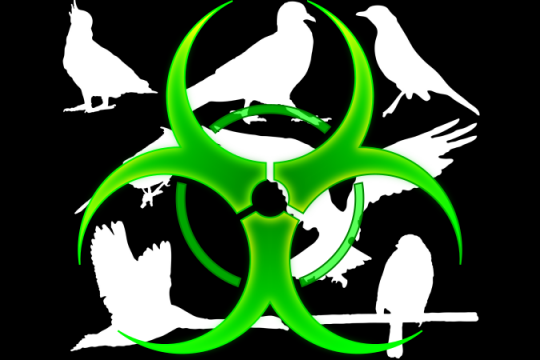Most dangerous disease of 2025?

Thanks to effective vaccines and evidence-based treatment, Covid-19 is not the most dangerous disease of 2025. Equally unsurprising for experts is the fact that HIV, tuberculosis, and malaria are still the top three diseases of concern this year. These cover three different types of pathogens: viruses, bacteria, and parasites. All three collectively kill about 2 million people every year.
We in Europe and the US think of HIV, tuberculosis, and malaria as diseases of the past or as manageable chronic diseases. However, all three of these can come back. Malaria was, e.g., endemic in Finland before it slowly disappeared (last indigenous case in 1954). As a consequence of climate change, it could not only return but also spread into countries that have never seen it before. However, in Europe and the US, we probably should be most afraid of the bird flu (avian influenza). Why? Because all pieces are in place for the end of the world as we know it.
Influenza type A H5N1 is the type of bird flu currently writing headlines. It has recently caused many outbreaks in birds and cows. Also, humans have increasingly become infected by birds, cows, or drinking raw milk. The only thing that prevents the bird flu from becoming a pandemic is that the bird flu virus does not easily transmit from human to human. However, it only takes a single mutation to change this behavior (https://doi.org/10.1126/science.adt0180). With every infected human, the chance that this mutation happens increases. Influenza is notably an RNA virus, which does mutate on average much easier than a DNA virus. Therefore, it makes much sense to vaccinate the people who are at the greatest risk of contracting the disease, like poultry workers, bird ringers, or vets. Finland has started to do exactly that, and also several other EU countries are following a similar strategy. However, unless the rest of the planet follows, these actions won't make much of a dent in the global mountain of risk in front of us. The production of a bird flu vaccine is routine and could be done rather rapidly since the process is identical to the generation of the seasonal flu vaccine. But I doubt that it will be possible to vaccinate the population fast enough. Big countries like Germany apparently want to wait until the virus has mutated. How else can you interpret the statement of the German Federal Ministry of Health that Germany would only acquire bird flu vaccines ‘in the case of an existing or imminent threatening communicable disease’. What could possibly go wrong?
It is scary that in the US, somebody advocating raw milk might soon be the secretary of Health and Human Services. Other countries take the threat more seriously. While most countries - including Finland - have dismantled their state-run vaccine development centers years or decades ago, the UK maintained a state-owned vaccine development and evaluation center (VDEC, UKHSA's Vaccine Development and Evaluation Centre). The UK government has just tasked its VDEC with making 5 million doses of a bird flu vaccine to prepare for a possible epidemic (https://www.euronews.com/health/2024/12/03/uk-purchases-5-million-bird-f...).
With up to 30% mortality in humans, the bird flu makes Covid-19 (0.3% mortality for unvaccinated people my age) look like a bargain. While the 30% mortality rate is likely an overestimate, even a 3% mortality rate would still be about 10 times worse than COVID-19. Differently from COVID-19, we know the virus and could be well prepared. But with an incompetent government (and I am not only thinking of the coming US government), we are heading straight for the apocalypse. It is unlikely that any warp-speed operation or vaccination campaign will be fast enough to catch up with the flu wave that will be rolling around the globe faster than ever due to air travel having surpassed pre-COVID-19 levels and further on the rise. Happy New Year - and don't forget to stockpile toilet paper!
This piece is loosely based on the discussion about emerging diseases in episode #1017 of the The Skeptics’ Guide to the Universe podcast..



